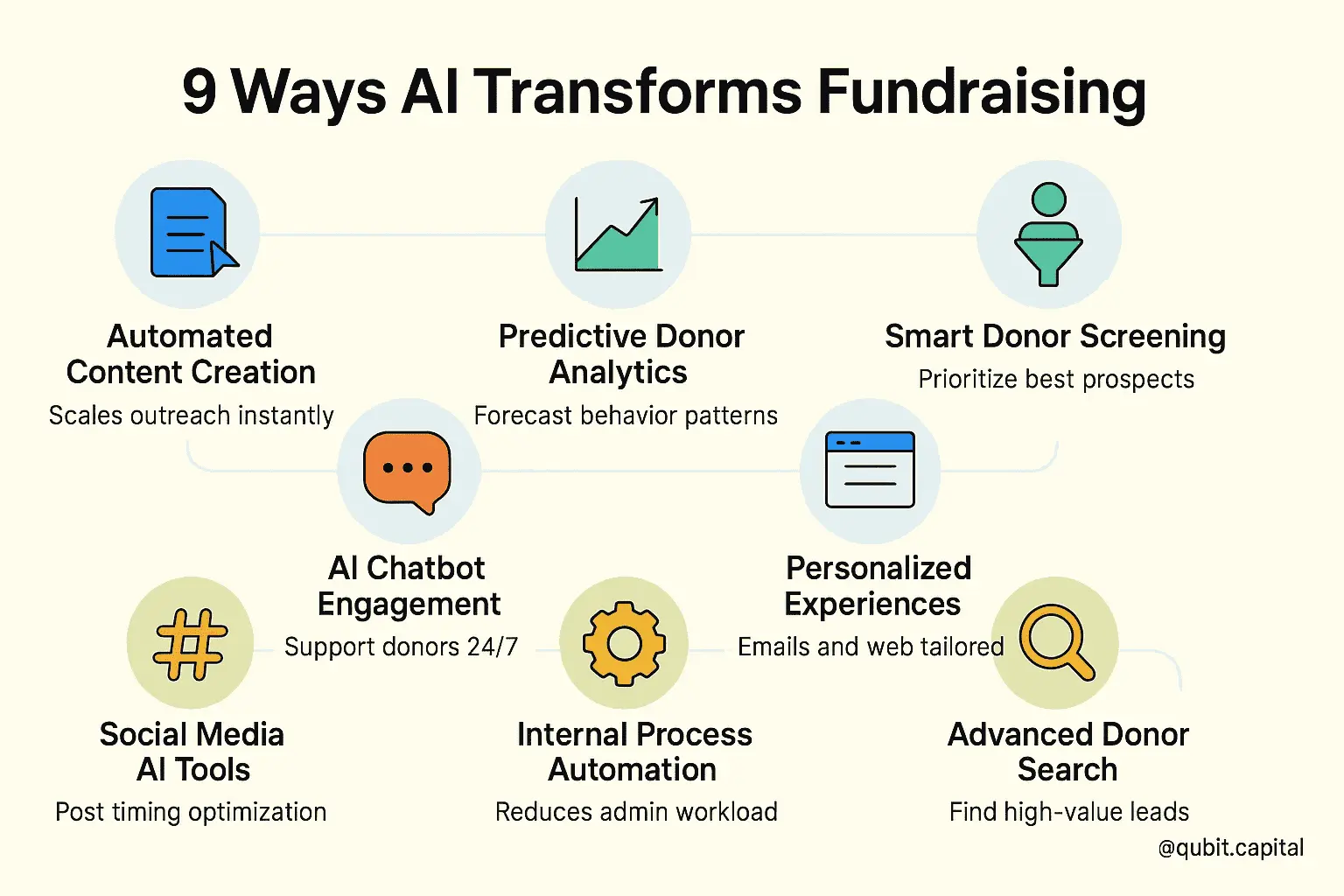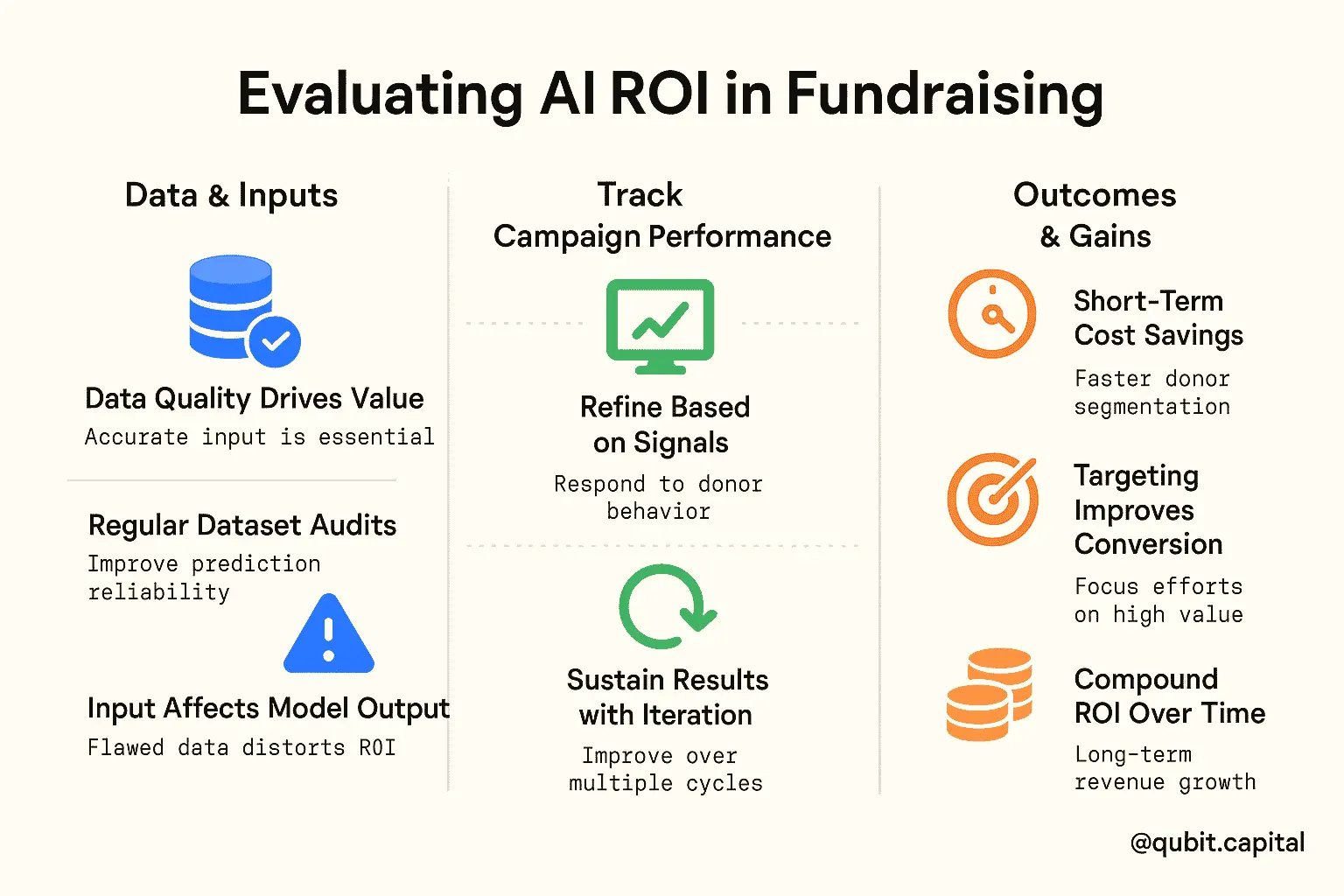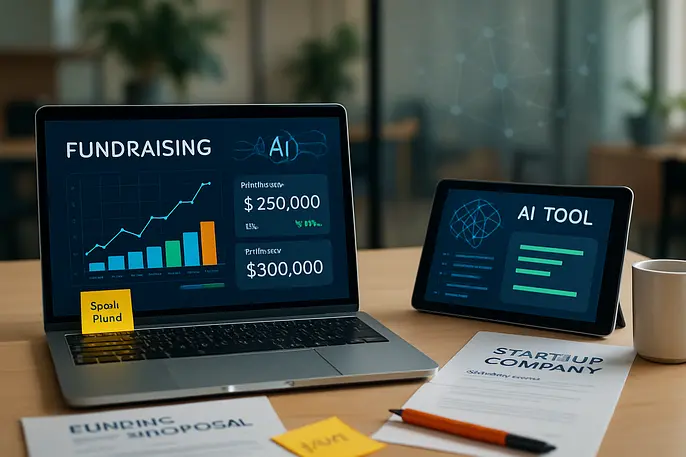Fundraising for startups has always been a challenging endeavor, but artificial intelligence is transforming the process with innovative tools that simplify and accelerate key tasks. From identifying potential investors to crafting personalized pitches, AI is reshaping how startups secure funding.
A review of AI-enhanced financial matching is reflected in startup investor matchmaking platforms, where the dynamics of digital networking merge with traditional investor relations. These platforms exemplify how AI can bridge gaps between startups and investors, making connections faster and more precise.
This blog explores the top AI tools revolutionizing fundraising, highlighting their applications, benefits, and strategic insights. Let’s jump right in to uncover how startups can harness AI to fuel their growth.
What AI-Enhanced Fundraising Means for You
AI-enhanced fundraising is revolutionizing how organizations connect with donors and optimize their efforts. By integrating machine learning models, natural language processing, and predictive analytics into fundraising strategies, this approach transforms traditional, manual processes into streamlined, data-driven operations. The result? A more efficient and personalized donor experience.
One of the most significant benefits of AI in fundraising is its ability to automate outreach. Instead of relying on time-consuming manual research, AI tools analyze vast amounts of data to identify potential donors and predict their likelihood of contributing. This predictive accuracy ensures that organizations focus their resources on the most promising opportunities, saving time and effort.
Additionally, AI personalizes donor interactions in ways that were previously unimaginable. By analyzing donor behavior and preferences, AI tailors communication to resonate with each individual. This level of customization fosters stronger connections and enhances donor engagement. Over half of nonprofits are using AI to support their charitable goals, the adoption of AI in the nonprofit sector has grown rapidly, demonstrating its transformative potential.
AI fundraising doesn’t just improve efficiency; it also empowers organizations to make data-backed decisions. By replacing guesswork with actionable insights, nonprofits can allocate resources more effectively and achieve their goals faster. As a result, AI is not just a tool, it’s a game-changer for modern fundraising strategies.
How Core AI Can Transform Your Fundraising Process
Artificial Intelligence (AI) is reshaping the way organizations approach fundraising, offering tools that enhance efficiency, personalization, and engagement. By integrating AI into your fundraising strategy, you can streamline operations, predict donor behavior, and create meaningful connections with supporters. This section explores the transformative potential of AI in fundraising, covering applications such as automated content creation, predictive analytics, donor screening, and more

1. Automated Content Generation
Crafting compelling content is essential for successful fundraising campaigns. Generative AI tools like ChatGPT can rapidly produce persuasive fundraising content tailored to different audiences. For example, ChatGPT can assist in composing personalized emails, creating engaging social media posts, and even automating donor Q&A. Teams can rely on a generative AI tool used for content generation and donor communication to quickly draft multiple versions of donor outreach messages, enabling multi-variant testing to identify the most effective approach.
This automation not only saves time but also ensures consistency in messaging, allowing fundraisers to focus on strategy rather than repetitive tasks.
2. Predictive Analytics for Donor Behavior
Understanding donor behavior is critical for optimizing fundraising efforts. Predictive analytics, powered by machine learning, enables organizations to forecast donor actions and preferences with remarkable accuracy. By analyzing historical data, nonprofits can determine the best times to launch campaigns and identify optimal donation amounts for individual donors.
As machine learning models refine data analysis, organizations can automatically personalize funding requests, ensuring a data-driven approach to fundraising. For instance, tracking prospective donor signals allows nonprofits to follow the increasing use of predictive analytics to forecast donor behavior and optimize ask amounts, resulting in more targeted and effective campaigns.
3. Enhanced Donor Screening
AI-powered donor screening tools consolidate data from multiple sources, significantly reducing the time spent on manual research. These tools analyze donor demographics, giving history, and online activity to provide a comprehensive profile of potential supporters. This streamlined process helps organizations prioritize high-value prospects and tailor their outreach accordingly.
By automating donor screening, fundraisers can allocate resources more efficiently, focusing their efforts on individuals most likely to contribute.
4. 24/7 Engagement with AI Chatbots
Maintaining constant communication with donors is a challenge for many organizations. AI chatbots offer a solution by providing round-the-clock engagement. These virtual assistants can answer common donor questions, guide users through the donation process, and even share updates about ongoing campaigns.
This level of accessibility enhances the donor experience, fostering trust and loyalty while freeing up staff to focus on more complex tasks.
5. Dynamic Visual and Multimedia Tools
AI can also elevate the visual appeal of fundraising campaigns. By analyzing donor preferences, AI tools can generate dynamic visuals and multimedia content that resonate with specific audiences. From personalized video messages to interactive infographics, these tools make campaigns more engaging and memorable.
6. Personalized Email and Website Functionalities
Personalization is key to building strong donor relationships. AI-powered platforms can customize email content and website experiences based on individual donor preferences and behaviors. For example, AI can recommend specific donation tiers or suggest volunteer opportunities aligned with a donor’s interests.
This tailored approach not only increases engagement but also boosts conversion rates, as donors are more likely to respond to messages that feel relevant and personal.
7. Social Media Optimization
Social media platforms are invaluable for reaching potential donors, and AI can optimize this outreach. By analyzing engagement metrics, AI tools can identify the best times to post, the most effective content formats, and the topics that resonate most with your audience.
This data-driven strategy ensures that your social media efforts yield maximum impact, driving traffic to your campaigns and increasing donor participation.
8. Productivity Enhancements
AI doesn’t just improve donor-facing activities, it also streamlines internal processes. From automating administrative tasks to managing donor databases, AI tools enhance productivity across the board. This efficiency allows organizations to allocate more time and resources to strategic initiatives, ultimately improving fundraising outcomes.
9. Advanced AI-Powered Search Capabilities
Finally, AI-powered search tools make it easier to identify potential donors and partners. By analyzing vast amounts of data, these tools can uncover connections and opportunities that might otherwise go unnoticed. This capability is particularly valuable for identifying corporate sponsors or major gift prospects.
AI is revolutionizing the fundraising landscape, offering tools that empower organizations to work smarter, not harder. By embracing these technologies, nonprofits can build stronger donor relationships, optimize their campaigns, and achieve their fundraising goals more effectively.
Top AI Fundraising Tools for Startups
Qubit Capital
Qubit Capital is an AI-powered investor-matchmaking and fundraising platform that streamlines discovery, outreach, and deal flow for founders. Launched in 2020, it has facilitated $215 M+ across 64 startups by using machine learning to score investor–startup fit, personalize outreach at scale, and surface high-probability targets from a global network of 20 000+ investors. Blending proprietary algorithms with human strategists, Qubit moves teams from research to meetings faster, without sacrificing quality or context.
Best for: Seed to Series B startups raising $150 K–$30 M in SaaS, fintech, health-tech, climate, deep-tech, and consumer.
Core features:
- AI relevancy scoring that aligns thesis, sector, stage, check size, geography, and portfolio patterns
- Precision investor mapping with data-rich profiles and prioritization
- Automated, personalized outreach calibrated to investor preferences
- Integrated pitch-deck and financial-model creation
- Outcome-based feedback loops that refine targeting from response and meeting data
Why it stands out: Combines proprietary AI with expert support, covers VC, PE, corporates, angels, and family offices across the US, UK, Europe, and India, and routinely delivers 30 + warm intros within weeks.
Harmonic.ai
Harmonic specializes in early-signal discovery. Its machine-learning engine tracks millions of company domains, hiring boards, and social indicators, alerting users when a stealth startup begins scaling. The natural-language “Scout” agent lets investors type briefs like “pre-seed B2B generative-AI startups in APAC,” then auto-populates a watch list. Best for micro-VCs and accelerators that need the earliest possible heads-up on emerging deals.
Key strengths:
- Median 45-day lead over public databases
- Role-based hiring velocity and founder pedigree filters
- Chrome extension that surfaces firm data on any site visited
Floww
UK-based Floww combines data-standardization with AI matchmaking. Founders upload operating metrics; the platform cleans and benchmarks the data, then recommends relevant investors from a network of 30 000+. For funds, Floww provides diligence-ready data rooms and live KPI dashboards, reducing back-and-forth document requests.
Notable features:
- Automated financial validation and growth-rate scoring
- Investor “Fit Index” derived from historic deal patterns
- End-to-end workflow—deck hosting, data room, e-sign, and cap-table sync
Dealroom Signal
Dealroom’s Signal module layers predictive analytics onto its 2 M-company database. It assigns momentum scores based on web-traffic growth, employee-count acceleration, and keyword heat. Users can filter for “quiet” but fast-moving startups that have raised <$2 M yet score in the top decile for traction—an ideal hunting ground for seed funds.
Highlights:
- Predictive valuation ranges trained on 18 000 exits
- Sector and geography heat-maps trusted by EU innovation agencies
- API and Zapier hooks for piping leads into any CRM
Affinity Relationship Intelligence
Affinity isn’t a deal-sourcing database; it’s a relationship-graph CRM powered by natural-language processing. By mapping more than one trillion email and calendar interactions, Affinity uncovers the warmest path to any target investor or founder. Funds use it alongside discovery tools like Qubit or Harmonic to increase meeting conversion rates.
Key capabilities:
- Automatic contact enrichment and deduplicated founder profiles
- AI-driven “Paths” that reveal who in your network can provide the strongest intro
- Post-meeting sentiment tagging and follow-up nudges to keep deals warm
Find the Best AI Tools to Elevate Your Fundraising
Selecting the right AI tools for fundraising can transform your approach to donor engagement and operational efficiency. However, the process requires a clear understanding of your goals and the specific features that align with them. Whether you're aiming to enhance donor retention, streamline communication, or predict funding trends, the right platform can make all the difference.
1. Define Your Fundraising Objectives
Before diving into the sea of AI platforms, it's essential to pinpoint your fundraising priorities. Are you looking to improve donor engagement, automate repetitive tasks, or identify high-potential donors? By clarifying your objectives, you can narrow your search to tools that directly address your needs. For instance, if donor retention is your focus, platforms with predictive analytics and personalized communication capabilities should be at the top of your list.
Additionally, consider how these tools align with your donor demographics. A younger audience might respond well to AI-driven social media campaigns, while older donors may prefer personalized email outreach. Tailoring your technology choices to your audience ensures that your efforts resonate effectively.
2. Evaluate Key Features
Not all AI tools are created equal, and their value lies in the features they offer. Here are some critical functionalities to look for:
- Predictive Analytics: These tools analyze past donor behavior to forecast future trends, helping you identify potential high-value donors and optimize your campaigns.
- CRM Integration: Seamless integration with your existing Customer Relationship Management (CRM) system ensures that donor data is centralized and actionable.
- Content Automation: From personalized emails to dynamic social media posts, automation tools save time while maintaining a human touch in your communications.
When evaluating platforms, prioritize those that offer a combination of these features to maximize their impact on your fundraising efforts.
3. Compare Costs and ROI
Budget considerations are always a factor, but it's crucial to weigh the cost of a platform against its potential return on investment (ROI). Some tools may have a higher upfront cost but offer significant long-term benefits, such as increased donor retention or reduced administrative workload.
For example, AI tools that automate repetitive tasks can free up your team to focus on strategic initiatives, ultimately driving more donations. Similarly, platforms with robust analytics capabilities can help you allocate resources more effectively, ensuring that every dollar spent contributes to your goals.
4. Assess Ease of Integration
The best AI tools are those that integrate seamlessly into your existing workflows. Complicated setups or tools that require extensive training can hinder adoption and reduce their overall effectiveness. Look for platforms with user-friendly interfaces and strong customer support to ensure a smooth transition.
Moreover, consider how the tool fits into your broader fundraising strategy. For instance, AI-driven discovery methods can complement traditional approaches, as highlighted in the analysis of fundraising services for startups. By combining innovative tools with established methods, you can create a well-rounded strategy that maximizes your outreach potential.
5. Align Technology with Donor Engagement Goals
Finally, ensure that your chosen tools support your broader donor engagement objectives. AI platforms can enhance personalization, making donors feel valued and connected to your mission. For example, tools that analyze donor preferences can help you craft targeted campaigns that resonate on a deeper level.
Additionally, AI can improve investor discovery processes, as discussed in platforms to find startup investors. By leveraging data-driven insights, you can identify and engage with potential donors more effectively, broadening your financial outreach.
How to Assess AI’s Financial Impact and ROI in Fundraising
Evaluating the financial impact of AI in fundraising requires a blend of short-term analysis and long-term strategic thinking. While immediate efficiency gains are often the first noticeable outcome, the true value of AI lies in its ability to deliver compounding returns over time.

The Role of Data Quality in ROI
High-quality data forms the backbone of any AI-powered fundraising initiative. AI systems rely on accurate, well-maintained datasets to generate actionable insights. Poor data quality can lead to flawed predictions, undermining the effectiveness of campaigns and reducing ROI. Regular audits and updates to donor databases ensure that AI tools operate at their full potential, maximizing both short-term and long-term financial outcomes.
Monitoring Campaigns for Continuous Improvement
AI’s financial impact doesn’t end with implementation. Consistent monitoring of fundraising campaigns is essential to identify trends, optimize strategies, and address inefficiencies. For instance, AI can analyze donor behavior in real-time, allowing organizations to adjust their messaging or outreach methods to improve engagement. These iterative improvements not only enhance immediate campaign results but also contribute to sustained growth in donor retention and revenue.
Short-Term Gains, Long-Term Rewards
The initial benefits of AI often manifest as time savings and cost reductions. Tasks like donor segmentation, email personalization, and predictive analytics become faster and more accurate, freeing up resources for other priorities. Over time, these efficiencies compound, leading to significant ROI. For example, better donor targeting can increase conversion rates, while predictive models can help identify high-value donors earlier in the pipeline.
By focusing on data quality and maintaining a cycle of monitoring and refinement, organizations can unlock the full financial potential of AI in their fundraising efforts.
What Success Stories Teach Us About AI in Fundraising
Real-world examples of AI integration in fundraising reveal its transformative potential, particularly in boosting revenue and improving donor retention. One standout case is the Regional Medical Center Foundation, which achieved a remarkable 156% increase in grateful patient revenue by combining Salesforce Nonprofit Cloud with DonorSearch AI. This success highlights the power of AI-driven prospecting in healthcare philanthropy, where identifying high-value donors is critical.
How AI Integration Drives Results
The integration of AI with CRM systems has proven to be a game-changer for organizations aiming to optimize their fundraising strategies. By automating donor analysis and streamlining outreach, AI tools enable nonprofits to focus on building meaningful relationships with supporters. For example, the Regional Medical Center Foundation’s use of Salesforce Nonprofit Cloud demonstrates how AI can enhance donor segmentation and personalize communication, leading to measurable improvements in engagement and retention.
AI tools also play a pivotal role in investor mapping tools, which support methodical donor analysis. These tools use digital mapping to identify potential donors and align them with specific fundraising goals. The framework presented in investor mapping tools illustrates how AI integrations can simplify complex processes, ensuring that organizations target the right audience effectively.
Practical Outcomes from AI Adoption
The measurable outcomes of AI adoption in fundraising extend beyond revenue growth. Organizations report improved donor retention rates, enhanced operational efficiency, and more accurate forecasting of fundraising campaigns. These benefits stem from AI’s ability to process vast amounts of data, uncovering actionable insights that would be difficult to identify manually.
For nonprofits, the ability to predict donor behavior and tailor outreach strategies is invaluable. The Regional Medical Center Foundation’s success underscores the importance of combining AI with robust CRM systems to achieve superior results. By leveraging AI-driven tools, organizations can not only increase revenue but also foster long-term donor loyalty.
How to Tackle Adoption Barriers and Ethical Concerns in AI
Adopting AI in fundraising often encounters hurdles that can slow progress. Resistance to change within organizations and concerns over donor privacy are two of the most significant barriers. Many teams hesitate to embrace AI due to unfamiliarity with the technology or fear of disrupting established workflows. Additionally, the high cost of training staff to use AI tools effectively can deter adoption.
To address these challenges, organizations must prioritize proactive strategies. First, fostering a culture of openness to innovation is essential. This can be achieved by involving staff early in the AI implementation process and highlighting how AI can enhance, rather than replace, their roles. Second, investing in comprehensive training programs ensures employees feel confident and capable when working with AI tools.
Ethical concerns, particularly around donor data privacy, also require careful attention. Establishing clear ethical guidelines and robust data management practices can help build trust with donors. For instance, organizations should adopt transparent policies on how AI processes donor information and ensure compliance with data protection regulations.
What AI’s Future Means for Your Fundraising Strategy
Artificial intelligence is revolutionizing how organizations connect with donors, and its impact on fundraising strategies is only set to deepen. Emerging technologies like voice and conversational AI, along with advanced predictive analytics, are reshaping the way nonprofits and businesses engage their supporters.
Voice and Conversational AI: A New Era of Engagement
Voice and conversational AI are creating fresh opportunities for donor communication. Imagine a scenario where potential donors can interact with your organization through voice assistants or chatbots, receiving personalized responses to their questions in real time. These tools not only streamline communication but also make it more accessible, allowing donors to engage on their terms. This innovation is particularly valuable for reaching tech-savvy audiences who expect seamless, on-demand interactions.
Advanced Predictive Analytics: Precision in Donor Segmentation
The future of fundraising lies in data-driven decision-making, and advanced analytics are at the forefront of this transformation. Predictive models can analyze donor behavior, preferences, and giving patterns to refine segmentation strategies. This means organizations can craft highly personalized campaigns that resonate with specific donor groups, increasing the likelihood of contributions. For example, predictive analytics can identify donors who are most likely to upgrade their giving levels or those who might respond positively to a particular cause.
These advancements in AI are not limited to donor engagement alone. They also extend to improving the tools used in fundraising efforts.
Conclusion
AI has redefined the way startups approach fundraising, offering innovative strategies to enhance donor engagement and maximize ROI. Throughout this blog, we’ve explored actionable insights that demonstrate how integrating AI can streamline processes, personalize outreach, and ultimately transform fundraising outcomes. These advancements are not just theoretical, they are practical tools that can drive measurable success.
As the fundraising landscape evolves, embracing AI strategically is no longer optional; it’s essential for staying competitive. By adopting these technologies, startups can unlock new opportunities, build stronger connections with donors, and achieve sustainable growth.
If you’re ready to elevate your fundraising efforts, our Investor Outreach service is here to help. Let’s work together to create impactful strategies tailored to your goals. Discover how we can support your journey today.
Key Takeaways
- AI transforms fundraising by automating outreach and enhancing donor engagement.
- Startups can see significant ROI improvements, sometimes up to 300-500% over 18 months.
- Effective implementation requires clear objectives, continuous staff training, and ethical data practices.
- Selecting the right AI tools is critical to align with specific fundraising goals.
- Real-world case studies validate the transformative impact of AI in fundraising.
Frequently asked Questions
What are the best AI tools for fundraising?
The most effective AI tools for fundraising include generative content solutions, predictive analytics platforms, and AI-powered donor research tools. These technologies are tailored to simplify campaign management and deliver improved results.






